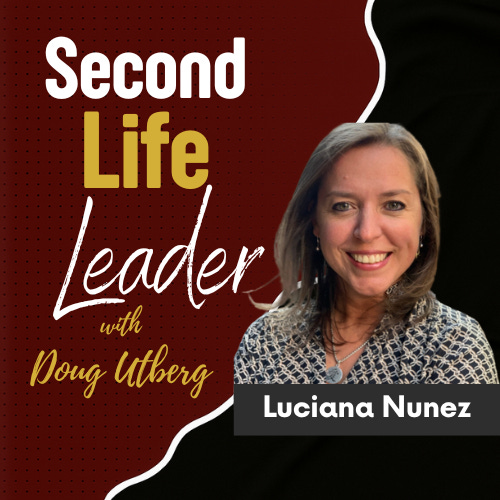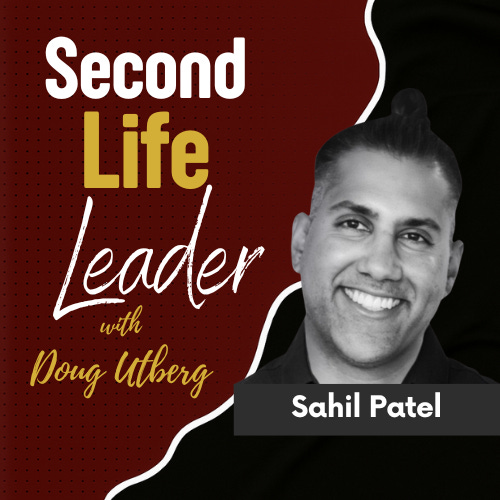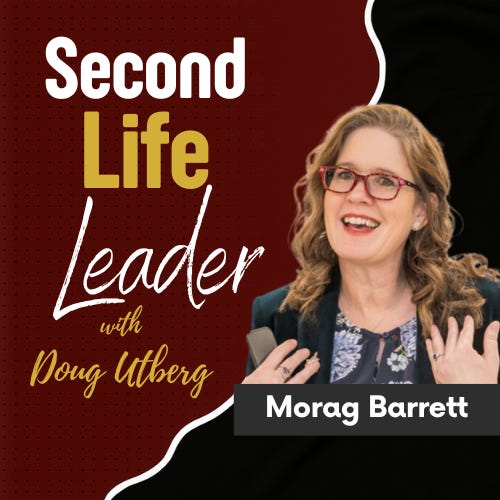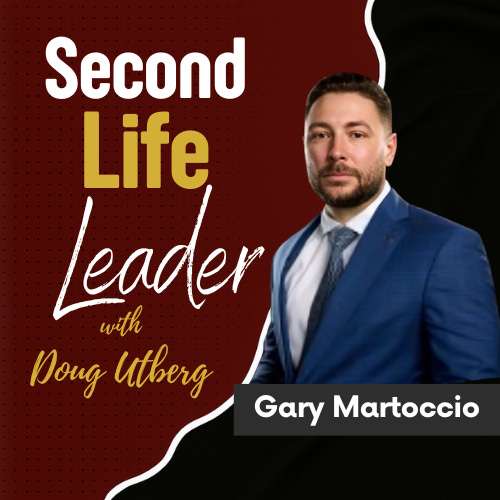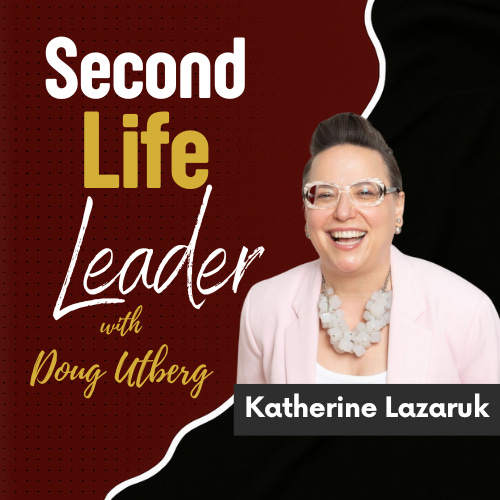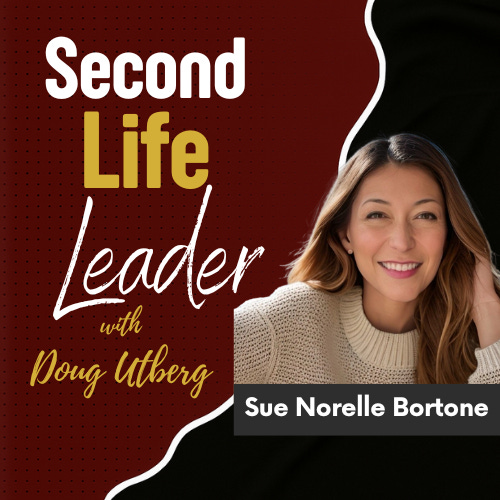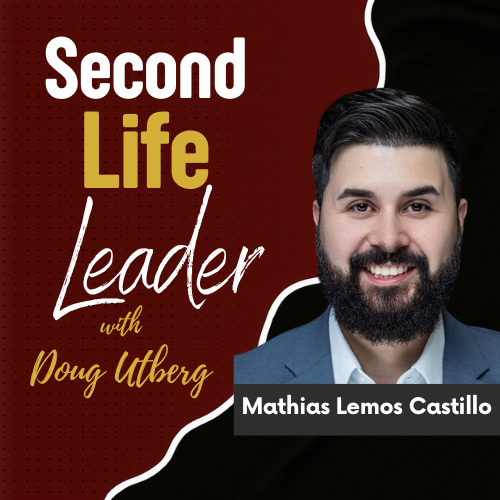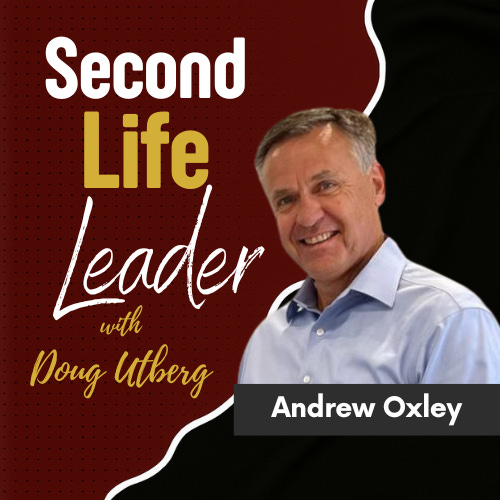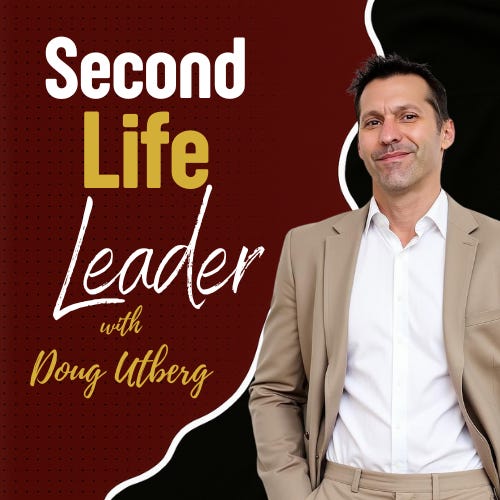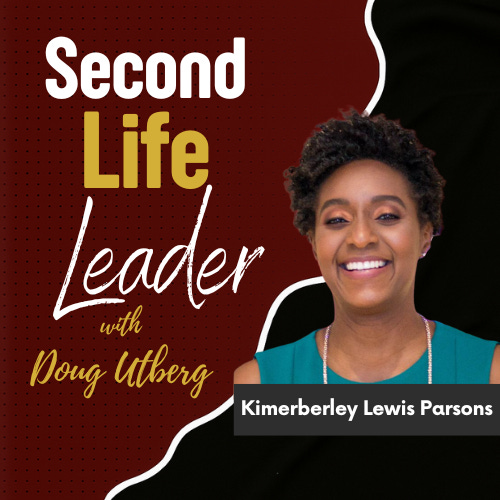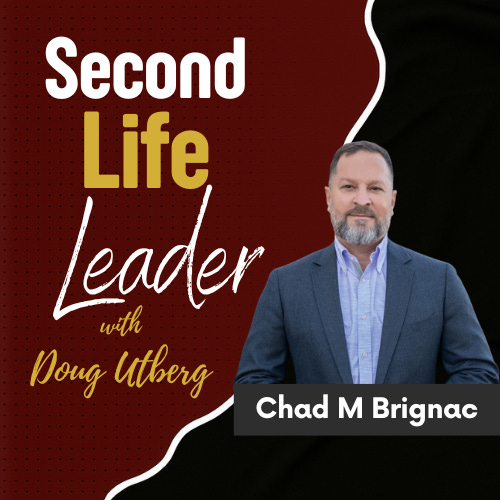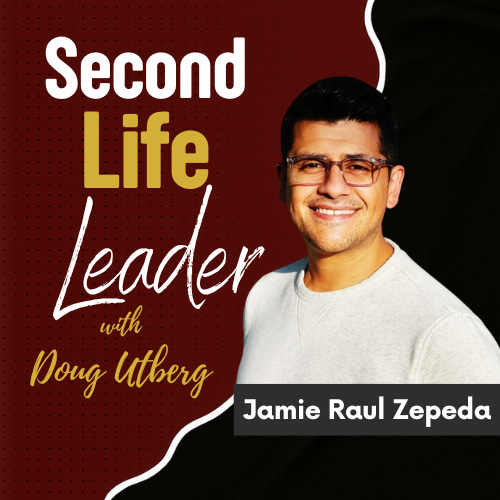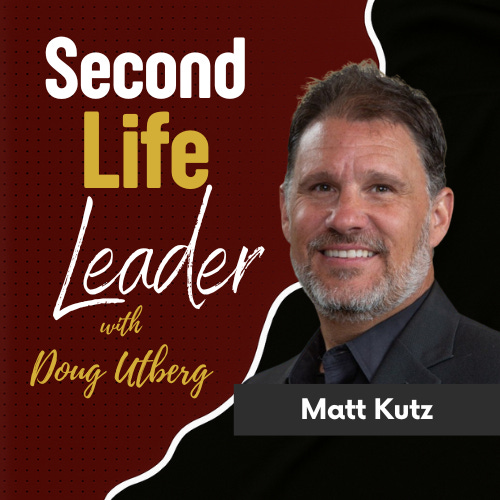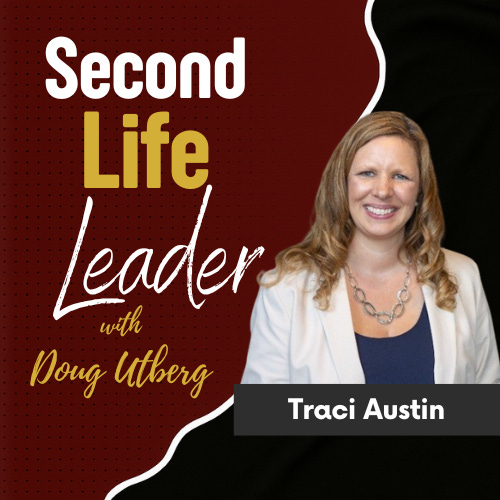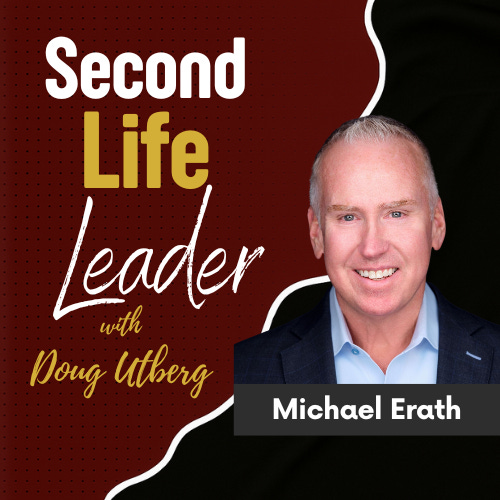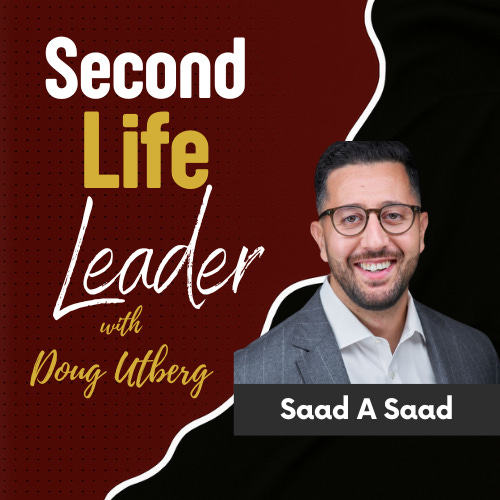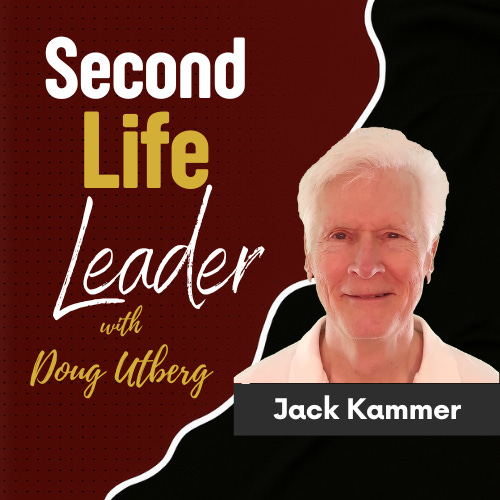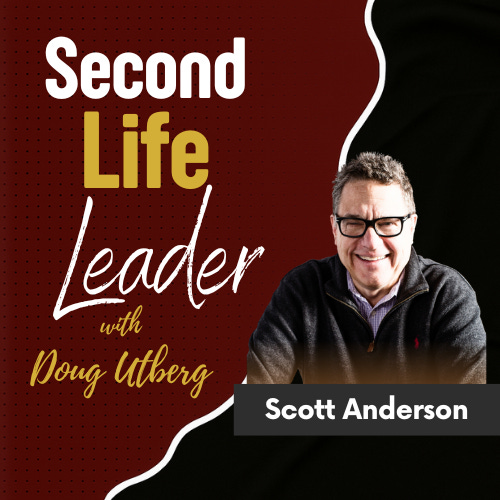Discover Second Life Leader
Second Life Leader

Second Life Leader
Author: Doug Utberg
Subscribed: 38Played: 2,535Subscribe
Share
© Doug Utberg
Description
From Setback to Success – Second Life Leader tells founder stories of rebuilding companies and leading teams through challenge and change
I’m Doug Utberg, and this platform is for founders, rebuilders, creatives, and professionals who’ve been knocked down by layoffs, divorce, burnout, or failure—and still refuse to quit.
Each episode delivers raw, unsanitized conversations with leaders who’ve walked through fire, rebuilt from nothing, and now lead with clarity, presence, and conviction.
We talk:
Career reinvention and self-leadership
Burnout recovery and nervous system rebuilding
Ethical entrepreneurship and post-collapse strategy
Using AI and automation to reclaim time and sovereignty
This isn’t a show about playing nice.
It’s about building something that can’t be taken from you.
📩 Want to go deeper?
The podcast sparks the rebuild—
But the newsletter is where the real work happens.
🎙 Second Life Leader is where rebuilders, warriors, and sovereigns come to rise after collapse. No hype. No guru scripts. Just real strategies, raw stories, and the clarity you need to rebuild stronger.
👉 Discover your Leader Archetype and get your personalized roadmap: https://leaderquiz.app
www.dougutberg.com
I’m Doug Utberg, and this platform is for founders, rebuilders, creatives, and professionals who’ve been knocked down by layoffs, divorce, burnout, or failure—and still refuse to quit.
Each episode delivers raw, unsanitized conversations with leaders who’ve walked through fire, rebuilt from nothing, and now lead with clarity, presence, and conviction.
We talk:
Career reinvention and self-leadership
Burnout recovery and nervous system rebuilding
Ethical entrepreneurship and post-collapse strategy
Using AI and automation to reclaim time and sovereignty
This isn’t a show about playing nice.
It’s about building something that can’t be taken from you.
📩 Want to go deeper?
The podcast sparks the rebuild—
But the newsletter is where the real work happens.
🎙 Second Life Leader is where rebuilders, warriors, and sovereigns come to rise after collapse. No hype. No guru scripts. Just real strategies, raw stories, and the clarity you need to rebuild stronger.
👉 Discover your Leader Archetype and get your personalized roadmap: https://leaderquiz.app
www.dougutberg.com
354 Episodes
Reverse
Most people think leadership is about having answers. In reality? AI already has those. The leaders who win next are the ones who know how to ask better questions.In this episode, Luciana and I trace the evolution from old-school hierarchy (titles, power, layers, politics) into something flatter, peer-driven, and choice-based — where people follow you because they want to, not because they “report” to you.We dig into how AI accelerates this shift, why the next generations won’t tolerate traditional management structures anyway, and why solopreneurs will scale bigger than ever without hiring armies of employees. And most importantly, how coaching — real coaching — becomes the meta-skill that makes people better thinkers, better collaborators, and better humans.Luciana also shares her trilogy model for helping anyone move from where they are to where they want to be, why listening is a superpower, and how the best leaders guide people to their own answers instead of supplying canned solutions. Think less “Cobra Kai drill sergeant,” more “Mr. Miyagi builds muscle memory while you think you’re just sanding the deck.”This isn’t soft leadership. It’s the new competitive edge.TL;DR* AI kills “leader as the answer-giver.” The winners will be the leaders who ask the right questions.* Hierarchy is collapsing. Future teams form around choice, not authority.* Solopreneurs scale bigger. AI makes “teams of one” way more powerful.* Coaching = the foundational skill. Listening + powerful questions = 10x commitment.* The trilogy model: What do you want → How will you get it → Who does what by when.* People own what they discover. If they found the solution, they’ll fight for it.* Next-gen leaders will not tolerate 1950s management. Flat, peer-based, and values-driven is the future.Memorable Lines“AI gives you the answers. Leaders win by knowing which questions matter.”“Authority doesn’t make people follow you. Being worth following does.”“Coaching isn’t teaching — it’s helping someone see what’s already within them.”“When someone finds their own answer, their commitment goes up 10x.”“The new organizational chart is horizontal — not vertical.”GuestLuciana Nunez — Executive Coach, former CEO & GM, 20+ years in corporate leadership, now helping leaders upgrade from command-and-control to collaborative, coaching-based leadership.LinkedIn: https://www.linkedin.com/in/luciana-nunez-coachny/Wesbite: https://www.theprestonassociates.com/Why This MattersIf you want to stay relevant as AI reshapes work, you need to master the one thing machines can’t replicate:human guidance, human insight, and human development.Leadership is no longer about being the smartest person in the room — it’s about being the person who unlocks everyone else’s smartest thinking.This episode shows you how.Call to ActionIf this conversation lit something up for you, don’t just let it fade. Come join me inside the Second Life Leader community on Skool. That’s where I share the frameworks, field reports, and real stories of reinvention that don’t make it into the podcast. You’ll connect with other professionals who are actively rebuilding and leading with clarity. The link is in the show notes—step inside and start building your Second Life today.https://secondlifeleader.com This is a public episode. If you would like to discuss this with other subscribers or get access to bonus episodes, visit www.dougutberg.com
In a world obsessed with hacks and mindset quotes, Sahil breaks down what actually builds momentum — consistent execution.Doug and Sahil explore how founders can use AI tools to automate busywork without losing the human edge, and why showing up every day — even when no one’s watching — still beats every algorithm. This episode dives into the difference between mindset fluff and measurable action, and how discipline compounds faster than luck or inspiration.TL;DR* Motivation fades — consistency wins.* AI is a multiplier, not a miracle. It rewards disciplined operators, not dreamers.* Growth comes from doing the boring work daily: follow-ups, systems, outreach.* Small, repeated actions compound into momentum and credibility.* The secret isn’t working harder — it’s working steadier.Memorable lines* “You don’t need motivation — you need momentum.”* “AI won’t save your business if you don’t show up for it.”* “Consistency compounds — that’s how empires are built.”* “Do the small things daily; the big results take care of themselves.”GuestSahil Patel — Entrepreneur and growth strategist helping founders scale through systems, accountability, and AI-powered efficiency.🔗 LinkedIn: https://www.linkedin.com/in/sahilanamipatel/🔗 Website: https://www.spiralyze.com/Why it mattersSuccess isn’t about hype — it’s about habits. In the AI era, the entrepreneurs who win aren’t the loudest, they’re the most consistent. This episode is a masterclass in pairing automation with discipline to create results you can actually measure — not just manifest.Call to ActionIf this conversation lit something up for you, don’t just let it fade. Come join me inside the Second Life Leader community on Skool. That’s where I share the frameworks, field reports, and real stories of reinvention that don’t make it into the podcast. You’ll connect with other professionals who are actively rebuilding and leading with clarity. The link is in the show notes—step inside and start building your Second Life today.https://secondlifeleader.com This is a public episode. If you would like to discuss this with other subscribers or get access to bonus episodes, visit www.dougutberg.com
Leadership expert and author Morag Barrett joins Doug Utberg to challenge the myth that “real connection means keeping the peace.” Together they unpack why the best teams — and the strongest friendships — aren’t the ones that avoid conflict, but the ones that use it to grow stronger.Morag, founder of SkyTeam, shares how two decades of leadership research revealed a truth few executives want to hear: false harmony kills innovation. Real connection, she says, requires friction, feedback, and the courage to say the hard things before a crisis hits.Doug reflects on his own journey from people-pleasing to presence — and how letting go of performance-based validation can create genuine relationships at work and in life. The result? A conversation that’s equal parts psychology, leadership, and personal transformation — reminding us that the path to trust runs straight through tension.TL;DR* Connection without conflict isn’t trust — it’s tolerance.* Great teams talk about tension before it breaks them.* Supporters agree; allies challenge and grow with you.* Presence beats performance — every time.* Friction, handled with care, forges deeper bonds.Memorable lines* “Connection isn’t soft — it’s steel wrapped in empathy.”* “Supporters make you comfortable; allies make you better.”* “False harmony is where innovation goes to die.”* “You can’t build trust if no one’s willing to be uncomfortable.”GuestMorag Barrett — Founder and CEO of SkyTeam, leadership expert, keynote speaker, and author of You, Me, We: Why We All Need a Friend at Work (and How to Show Up as One).- LinkedIn: - Website:Why it mattersTeams don’t fail from lack of skill — they fail from lack of trust. Learning to embrace healthy friction turns conflict into connection, feedback into growth, and work relationships into real human partnerships.Call to ActionIf this conversation lit something up for you, don’t just let it fade. Come join me inside the Second Life Leader community on Skool. That’s where I share the frameworks, field reports, and real stories of reinvention that don’t make it into the podcast. You’ll connect with other professionals who are actively rebuilding and leading with clarity. The link is in the show notes—step inside and start building your Second Life today.https://secondlifeleader.com This is a public episode. If you would like to discuss this with other subscribers or get access to bonus episodes, visit www.dougutberg.com
Employment attorney Gary Martoccio joins Doug Utberg to unpack how artificial intelligence is rewriting the rules of work — and where the law hasn’t caught up yet. From layoffs driven by automation to courts banning AI-written pleadings, Gary breaks down how fast this shift is moving and what workers need to know before they sign a severance package. Doug and Gary explore how fear, efficiency, and regulation are colliding — and why most people shouldn’t panic (yet).TL;DR* No federal or state laws currently prevent replacing humans with AI.* Discrimination in AI-related layoffs will trigger lawsuits — be careful who gets cut.* Severance packages often include waivers that kill your right to sue; read before signing.* AI is reshaping “back-office” legal work but can’t replace human judgment in court.* Courts are banning AI-generated filings to protect legal integrity.* The real danger isn’t mass job loss — it’s unchecked confusion, burnout, and trauma from constant change.Memorable lines* “Regulation always lags the market — and AI is running a marathon at sprint speed.”* “You can’t let ChatGPT argue your case in court — not yet, anyway.”* “Layoffs don’t have to be illegal, but they do have to be fair.”* “Don’t panic — AI isn’t taking every job, just the ones nobody wants to do.”Guest:Gary Martoccio — Employment attorney representing plaintiffs in workplace disputes; expert in wrongful termination, discrimination, and AI-related employment challenges.LinkedIn: https://www.linkedin.com/in/suenorelle/Website: https://www.nobletalent.group/Why it mattersAI isn’t just an innovation story — it’s a workforce revolution with no rulebook. Understanding where legal lines are drawn (and where they aren’t) helps both employers and employees navigate the next wave without getting blindsided. For founders, leaders, and teams, this episode is your roadmap to staying human — and lawful — in the automation age.Call to ActionIf this conversation lit something up for you, don’t just let it fade. Come join me inside the Second Life Leader community on Skool. That’s where I share the frameworks, field reports, and real stories of reinvention that don’t make it into the podcast. You’ll connect with other professionals who are actively rebuilding and leading with clarity. The link is in the show notes—step inside and start building your Second Life today.https://secondlifeleader.com This is a public episode. If you would like to discuss this with other subscribers or get access to bonus episodes, visit www.dougutberg.com
We explore how avoidance, disguised as politeness, slowly erodes trust — and how courageous conversations can actually strengthen relationships and performance. Katherine breaks down what “calling out the elephant” looks like in practice: reading the emotional landscape, choosing timing over impulse, and speaking truth without weaponizing it.From emotional intelligence to communication frameworks, we examine how leaders can replace fear with curiosity — and transform tension into alignment.TL;DR* Avoidance kills trust faster than conflict ever will.* Clarity + compassion = productive honesty.* Name the issue early — silence grows resentment.* True kindness includes telling the truth.* Courageous dialogue builds stronger, safer teams.Memorable lines* “Kindness without honesty is just avoidance in disguise.”* “The longer you avoid the elephant, the bigger it gets.”* “When you name what’s real, people finally exhale.”* “Courage isn’t about comfort — it’s about connection.”Guest: Katherine Lazaruk — Founder, LZRK Consulting | Executive Coach & Keynote Speaker LinkedIn: https://www.linkedin.com/in/katherinelazaruk/ Website: https://lzrkconsulting.com/Why it mattersEvery organization has its unspoken truths — unaddressed conflicts, performance gaps, or cultural tension. Leaders who learn to name those realities, with empathy and clarity, create workplaces where honesty isn’t feared but valued. The courage to speak the unsaid is what separates management from leadership.Call to ActionIf this conversation lit something up for you, don’t just let it fade. Come join me inside the Second Life Leader community on Skool. That’s where I share the frameworks, field reports, and real stories of reinvention that don’t make it into the podcast. You’ll connect with other professionals who are actively rebuilding and leading with clarity. The link is in the show notes—step inside and start building your Second Life today.https://secondlifeleader.com This is a public episode. If you would like to discuss this with other subscribers or get access to bonus episodes, visit www.dougutberg.com
Sue spent years leading high-performing teams in New York City’s recruitment world. Then came burnout, long commutes, and layoffs. With a newborn and a toddler at home, she decided to stop building other people’s companies and start her own. In this episode, we unpack what it really takes to pivot from paycheck to purpose — fear, patience, and the discipline to design a life around freedom, not frenzy.We dive into what founders get wrong about scale, how “stickiness” beats speed, and why being your own bottleneck can kill your dream faster than any competitor. From cash flow realities to the myth of overnight success, Sue shares the emotional and tactical lessons of rebuilding after collapse.TL;DR* The courage equation: Real growth = equal parts fear and excitement.* Don’t go back to burnout: Layoffs can be a chance to rebuild — not return.* Cash flow kills faster than failure: Design for early revenue before “scaling.”* Patience > virality: Shark Tank stories aren’t the norm — steady wins.* Stickiness beats scale: Differentiation creates sustainability.* AI advantage: Use GenAI for leverage, not replacement — efficiency still needs execution.* Don’t be your own bottleneck: Founders must delegate or automate to grow.Memorable lines* “If you’re doing the right thing, you should feel equal parts fear and excitement.”* “Nobody knows you’re here until you tell them — at least eight times.”* “Fast growth is sexy, but slow cash burn wins the long game.”* “AI can’t replace human grit — it just compresses the distance between idea and action.”Guest: Sue Bortone — Founder & Executive Coach, former NYC recruitment leader helping professionals rebuild their second act.LinkedIn: https://www.linkedin.com/in/suenorelle/Website: https://www.nobletalent.group/Why it mattersFreedom isn’t found in escaping failure — it’s earned by rebuilding smarter. Every founder in transition has to bet on themselves twice: once to leave, and again to last.Call to ActionIf this conversation lit something up for you, don’t just let it fade. Come join me inside the Second Life Leader community on Skool. That’s where I share the frameworks, field reports, and real stories of reinvention that don’t make it into the podcast. You’ll connect with other professionals who are actively rebuilding and leading with clarity. The link is in the show notes—step inside and start building your Second Life today.https://secondlifeleader.com This is a public episode. If you would like to discuss this with other subscribers or get access to bonus episodes, visit www.dougutberg.com
Executive coach and researcher Marina Morgan (Morgan Impact) joins me to explore what few founders talk about openly—entrepreneurial trauma—and how resilience, not hustle, becomes your survival skill in an age of constant disruption.Marina works with leaders to navigate emotional recovery after layoffs, bankruptcies, and burnout—real losses that rarely get social support. Together we unpack how AI, rapid change, and relentless uncertainty are reshaping not just business models, but our nervous systems.The conversation moves from neurophysiology to leadership—why trauma isn’t just mental, how adaptation speed varies person to person, and why founders need to treat resilience like revenue: measurable, trackable, and intentional.TL;DR* Entrepreneurial trauma: Failure leaves real physiological marks—acknowledge them.* AI stress loop: Fast tech shifts can outpace human adaptability.* Preventive care: Sleep, nutrition, and movement fuel better decisions.* Control what’s controllable: Focus energy on what you can change.* Resilience is ROI: Strong nervous systems create stronger companies.* Professional help matters: When reactions don’t fit reality, therapy restores alignment.Memorable lines* “Trauma isn’t just in your head—it’s in your MRI.”* “AI change is faster than our ability to adapt.”* “Your physical condition is your first strategy.”* “Resilience isn’t luck—it’s management.”Guest: Marina Morgan — Founder, Morgan ImpactLinkedIn: https://www.linkedin.com/in/marinamorgan-sf/Website: https://themorganimpact.com/Why it mattersEntrepreneurs experience real trauma—but rarely name it. As AI accelerates change, the leaders who will thrive aren’t the toughest—they’re the most self-aware, regulated, and resilient.Call to ActionIf this conversation lit something up for you, don’t just let it fade. Come join me inside the Second Life Leader community on Skool. That’s where I share the frameworks, field reports, and real stories of reinvention that don’t make it into the podcast. You’ll connect with other professionals who are actively rebuilding and leading with clarity. The link is in the show notes—step inside and start building your Second Life today.https://secondlifeleader.com This is a public episode. If you would like to discuss this with other subscribers or get access to bonus episodes, visit www.dougutberg.com
Originally from Uruguay and now based in Madison, WI, Matias helps cities and organizations connect with underheard voices. He reminds us that progress isn’t just technological—it’s social. Without infrastructure, access, and inclusion, adoption doesn’t happen.EVs, he argues, are a mirror for how we build systems: Who benefits, who’s left out, and who gets a say?TL;DR* Equity first: EV access must include every neighborhood, not just the affluent.* Infrastructure gap: Charging deserts echo old redlining patterns.* Ethical supply: Sustainable batteries require fair labor, not just clean tech.* Density wins: Transit, walkability, and urban design matter more than suburban car swaps.* Trust gap: People don’t adopt systems they don’t feel included in.Memorable lines* “We’ll buy in when it’s built for everyone.”* “You can’t be in community while there’s smoke. When the air clears, connection starts again.”* “Electric cars don’t build trust—people do.”Guest: Matias Lemos Castillo — Founder, MLC ConsultingLinkedIn: https://www.linkedin.com/in/mlemoscastillo/Website: https://consultantmlc.com/Why it mattersEV adoption is a trust story wrapped in a tech story. Until cities design for inclusion, access, and connection, the real revolution won’t be electric—it’ll be community-powered.Call to ActionIf this conversation lit something up for you, don’t just let it fade. Come join me inside the Second Life Leader community on Skool. That’s where I share the frameworks, field reports, and real stories of reinvention that don’t make it into the podcast. You’ll connect with other professionals who are actively rebuilding and leading with clarity. The link is in the show notes—step inside and start building your Second Life today.https://secondlifeleader.com This is a public episode. If you would like to discuss this with other subscribers or get access to bonus episodes, visit www.dougutberg.com
In an era where “understanding everyone’s feelings” often replaces holding standards, Andrew and I unpack how good intentions can quietly corrupt outcomes. The conversation cuts through the noise of soft leadership to reveal a tougher truth: empathy without clarity creates confusion, resentment, and burnout.We trace how businesses drift from mission to maintenance, how leaders lose edge trying to be liked, and why clarity—not compassion—actually sustains culture. Andrew shares frameworks he’s used to reintroduce accountability in teams that have “care fatigue,” where emotional overload blocks progress.This episode isn’t anti-empathy. It’s a reminder that empathy, like power, must be used with precision—or it turns toxic.TL;DR* Empathy becomes corruption when it excuses poor performance.* Great leaders balance compassion with consequence.* “Understanding” doesn’t mean “accepting”—clarity builds trust faster.* Accountability is the highest form of respect.* Teams burn out when emotion replaces direction.* The fix: empathy guided by structure, not sentiment.Memorable Lines“Empathy without standards becomes permission for mediocrity.”“If you care about your people, hold them to the level they’re capable of.”“Leaders don’t lose teams by being firm—they lose them by being fuzzy.”“The real kindness is clarity.”GuestAndrew Oxley — Founder & Leadership Strategist, helping organizations rebuild cultures around accountability, clarity, and growth without sacrificing human connection.LinkedIn: https://www.linkedin.com/in/andrew-oxley-tog/Website: http://www.transformingresults.comWhy This MattersWe’ve mistaken comfort for care. Real empathy isn’t about protecting people from discomfort—it’s helping them grow through it.When businesses learn to pair empathy with standards, they don’t just get better performance—they get stronger humans.Call to ActionIf this conversation lit something up for you, don’t just let it fade. Come join me inside the Second Life Leader community on Skool. That’s where I share the frameworks, field reports, and real stories of reinvention that don’t make it into the podcast. You’ll connect with other professionals who are actively rebuilding and leading with clarity. The link is in the show notes—step inside and start building your Second Life today.https://secondlifeleader.com This is a public episode. If you would like to discuss this with other subscribers or get access to bonus episodes, visit www.dougutberg.com
Most founders think ads are the only scalable way to grow. They aren’t. Aiden shows how outbound, done right, can outperform paid social—no algorithms, no ad bans, no CPM spikes. The secret isn’t “more hustle.” It’s smarter tech: parallel dialing that filters bad data, avoids spam flags, and connects live calls 10x faster.We trace the fall of traditional cold calls (three live connections per hundred dials), the rise of AI limits under TCPA, and why Facebook ads have quietly become a treadmill of copy rewrites, rising costs, and bot clicks. Aiden’s model flips the script—less burn, more control, and measurable consistency.Even more surprising: the next generation of inside sales agents aren’t in Silicon Valley—they’re Egyptian lawyers earning more cold-calling than in law. Global leverage meets old-school grit.This isn’t nostalgia for boiler rooms. It’s data-driven, tech-enabled human connection.TL;DR* “Cold calling is dead” is a myth—it just evolved with smarter tools.* Parallel dialers reach 700–800 numbers/hour with adaptive line control.* Real cost advantage: your time + dialer fee vs $10K ad testing cycles.* AI callers are banned under TCPA—human voice still wins trust.* Best ROI: trained inside sales agents + verified mobile data = predictable leads.* Bonus: outbound also builds partnerships, not just direct sales.Memorable lines“Cold calling isn’t dead—it’s just been automated, filtered, and reborn.”“You can’t out-ad Facebook’s algorithm, but you can out-call your competition.”“Consistency beats creativity when your pipeline depends on people.”“AI can’t legally sell for you—but real humans still can.”GuestAiden Sowa — Founder & CEO of Zoto Dialer, building next-gen multi-dialing systems that balance pickup rate, compliance, and speed for sales teams worldwide.LinkedIn: https://www.linkedin.com/in/aidansowa/Website: https://www.zotodialer.co/Why this mattersScaling isn’t about finding the next hack—it’s about control.Cold calling 2.0 delivers what ads can’t: consistent reach, predictable costs, and direct conversations that build trust faster than clicks. If inbound is chaos, outbound is the discipline that steadies growth.Call to ActionIf this conversation lit something up for you, don’t just let it fade. Come join me inside the Second Life Leader community on Skool. That’s where I share the frameworks, field reports, and real stories of reinvention that don’t make it into the podcast. You’ll connect with other professionals who are actively rebuilding and leading with clarity. The link is in the show notes—step inside and start building your Second Life today.https://secondlifeleader.com This is a public episode. If you would like to discuss this with other subscribers or get access to bonus episodes, visit www.dougutberg.com
We trace why “bring your whole self to work” fell flat, how subtle detractor patterns (ignoring, courtesy code switching, email habits) silently erode trust, and why inclusion is less about demographics and more about everyday micro-behaviors. Kimberly makes it real: when team members only get replies if they CC the boss, people stop trying. When leaders say they value input but don’t create safety, trust collapses.The surprise? Homogeneous teams with strong inclusion behaviors can outperform diverse ones without them. Inclusion isn’t about who’s at the table—it’s whether voices matter once they’re there.I push back on the myth of “leader angst”: making things better is the leader’s job. Kimberly adds the missing truth: the biggest cost isn’t money or time—it’s the vulnerability of having real conversations with your team.This isn’t theory. It’s leadership on the line. And it’s the difference between wasting hours in ignored emails versus amplifying effectiveness by 30% with no extra cost—just courage.TL;DR* Inclusion ≠ diversity quotas—it’s behaviors that create belonging.* Five detractor patterns silently kill inclusion (ignoring, courtesy code switching, etc.).* Leaders can’t outsource inclusion—HR can’t carry this, only teams can.* Effectiveness jumps when small friction points (like ignored emails) get fixed.* The real cost: leaders must get vulnerable, confront team dynamics, and stay accountable.Memorable lines “No one wakes up in the morning saying, ‘I hope I’m excluded today.’” “Courtesy code switching sounds respectful—but it actually silences voices.” “Making things better is literally the leader’s job. Otherwise, a bot could replace you.” “Inclusion isn’t a social program—it’s how you answer your team’s emails.”Guest Kimberly Lewis Parsons — Founder & CEO of Bamboo Teaming; expert in inclusive teaming, executive team coaching, and shifting leaders from ineffective habits to productive collaboration. 🔗 LinkedIn: https://www.linkedin.com/in/kimberleylewisparsons/Why this matters Inclusion isn’t about slogans—it’s about daily behavior. If leaders can’t create spaces where voices matter, teams lose trust, speed, and effectiveness. The next frontier of inclusion is practical: leaders modeling the behaviors that turn effort into impact.Call to ActionIf this conversation lit something up for you, don’t just let it fade. Come join me inside the Second Life Leader community on Skool. That’s where I share the frameworks, field reports, and real stories of reinvention that don’t make it into the podcast. You’ll connect with other professionals who are actively rebuilding and leading with clarity. The link is in the show notes—step inside and start building your Second Life today.https://secondlifeleader.com This is a public episode. If you would like to discuss this with other subscribers or get access to bonus episodes, visit www.dougutberg.com
We start with a simple truth: if something triggers you, it owns you. From marriages strained by defensiveness, to children calling out their father’s lack of emotional intelligence, Chad shows how unchecked reactions erode trust, respect, and legacy.His own turning point came when his son told him he had “zero emotional intelligence.” Instead of firing back, Chad began the slow work of asking why every sharp word stung—and what it revealed about his need for respect, affirmation, and value.We explore how men often hide behind discipline, how protection and fear shape family dynamics, and why “being open” is useless if you don’t create a safe environment for truth. The conversation turns personal—broken trust, blended families, strokes, and the moment Chad realized decades of construction projects weren’t a legacy if his family couldn’t stand him.The fix isn’t perfection. It’s self-awareness. Triggers are symptoms. And the healing comes when you let the people you’ve hurt tell you the truth—and you listen.TL;DR* Triggers own you until you own them.* Overreactions reveal insecurity, not reality.* Emotional intelligence starts with self-awareness, not slogans.* Legacy is people, not projects.* Leaders (and fathers) go first—healing is contagious.Memorable lines “Anything that triggers you is telling you more about yourself than the other person.” “Legacy isn’t bridges or hotels—it’s your kids wanting to talk to you.” “If you don’t create a safe environment, your ‘openness’ is just virtue signaling.”Guest Chad Brignac — Transformationalist consultant, speaker, and author of Blend Don’t Break, focused on self-awareness, emotional intelligence, and healing through small shifts.LinkedIn: https://www.linkedin.com/company/chadmbrignac/Why this matters Whether at work or at home, unchecked triggers destroy trust. Healing them isn’t just about avoiding fights—it’s about building a legacy of respect, connection, and compassion.Call to ActionIf this conversation lit something up for you, don’t just let it fade. Come join me inside the Second Life Leader community on Skool. That’s where I share the frameworks, field reports, and real stories of reinvention that don’t make it into the podcast. You’ll connect with other professionals who are actively rebuilding and leading with clarity. The link is in the show notes—step inside and start building your Second Life today.https://secondlifeleader.com This is a public episode. If you would like to discuss this with other subscribers or get access to bonus episodes, visit www.dougutberg.com
Right now, companies are leaning hard on AI—sometimes instead of people. Engagement is tanking, anxiety is spiking, and most leaders have no playbook. We unpack why workers sneak AI into their jobs, how silence from the top fuels fear, and why “pizza parties” don’t solve the fulfillment gap.The real story: engagement ≠ purpose. People want meaning, not slogans. And AI, like an Ivy League intern, can’t deliver that alone. Leaders need to connect tools, people, and mission—or risk losing their best talent.TL;DR* AI intern: smart but needs human guidance.* Engagement ≠ fulfillment: employees want purpose, not perks.* Fear gap: no AI policy = employees assume worst.* Work-life is merging: productivity ≠ meaning.* Future leaders: integrators who connect tech + humanity.Memorable lines “AI is like having an Ivy League intern—smart, fast, but still an intern.” “Engagement is attention. Fulfillment is purpose. Don’t confuse the two.” “If leaders don’t talk about AI, employees will imagine the worst.”GuestJaime Raul Zepeda — CEO, Best Companies Group; 15 years studying engagement; former VP at Great Place to Work.LinkedIn: https://www.linkedin.com/in/jaimezepeda/Website: https://jaimeraulzepeda.com/Why this matters To thrive in the AI era, companies must design for reality: clear AI policies, honest leadership, and cultures where people find meaning—not just a paycheck.Call to ActionIf this conversation lit something up for you, don’t just let it fade. Come join me inside the Second Life Leader community on Skool. That’s where I share the frameworks, field reports, and real stories of reinvention that don’t make it into the podcast. You’ll connect with other professionals who are actively rebuilding and leading with clarity. The link is in the show notes—step inside and start building your Second Life today.https://secondlifeleader.com This is a public episode. If you would like to discuss this with other subscribers or get access to bonus episodes, visit www.dougutberg.com
Most leaders think they’re setting the tone—but often, it’s someone else. Matt breaks down how to identify the real influencers in the room, recognize subtle shifts, and build a repeatable process for situational mastery.From his decades in sports medicine and leadership research, Matt shows how the same tools used to train Olympic athletes apply to executives, dads, and anyone navigating high-stakes conversations.TL;DR* Situational mastery ≠ luck: it’s about recognizing, reordering, responding, and reflecting (the R4 framework).* Invisible cues rule the room: deep sighs, eye rolls, micro-pauses—miss these and you miss the moment.* Leaders aren’t always the influencers: figure out who others look to for cues, and win them as allies.* Tacit knowledge = wisdom: mastery comes from integrating hindsight, insight, and foresight (3D thinking).* The pace of change breaks hindsight: you can’t solve today’s problems with yesterday’s logic—blend past, present, and future.* No solo mastery: like Dickens’ Scrooge, you need “ghosts” (mentors, coaches, truth-tellers) to correct blind spots.Memorable lines* “The metrics of success shift every time the room shifts.”* “Most leaders think they’re setting the tone—usually, they’re not.”* “Tacit knowledge is intuition you can trust, and it can be learned.”* “You can’t solve today’s problems with yesterday’s logic.”* “Every leader needs to know their Kissinger in the room.”GuestMatt Kutz, PhD — Professor of Sports Medicine & Athletic Training; VP of the World Federation of Athletic Training and Therapy; author of 8+ books on leadership, human performance, and global strategy.LinkedIn: https://www.linkedin.com/in/drmattkutz/Website: http://www.matthewkutz.comWhy this mattersLeaders today operate in a VUCA world—volatile, uncertain, complex, ambiguous. Titles don’t guarantee influence, and old playbooks don’t work. Contextual intelligence bridges the gap between knowing and being: it’s not just about logic or intuition, but the fusion of both in real time.If you want to lead effectively—whether in boardrooms, classrooms, or family rooms—you need the ability to read the invisible cues, reframe priorities on the fly, and adapt without losing credibility.Call to ActionIf this conversation lit something up for you, don’t just let it fade. Come join me inside the Second Life Leader community on Skool. That’s where I share the frameworks, field reports, and real stories of reinvention that don’t make it into the podcast. You’ll connect with other professionals who are actively rebuilding and leading with clarity. The link is in the show notes—step inside and start building your Second Life today.https://secondlifeleader.com This is a public episode. If you would like to discuss this with other subscribers or get access to bonus episodes, visit www.dougutberg.com
In this episode, Tracy and I break down why leaders cling to stories instead of facts, how “no one wants to work” is rarely true, and why 89% turnover in 90 days doesn’t mean failure—it means you’re solving the wrong problem. We dig into the hidden costs of poor onboarding, why perfection is the enemy of progress, and how small experiments compound into lasting change.We also role-play the hard conversations most leaders avoid: asking for resources, addressing pay gaps, and backing process changes. Tracy shows how turning impact into a clear request transforms whining into influence—and why fear of tough conversations keeps organizations stuck in chaos.The throughline: stop venting, start requesting. Systems won’t fix themselves, people won’t magically stay, and sales numbers don’t rise just because you hope they will. Elite leadership is having the clarity and courage to pitch the real solution.TL;DR* Complaints hide requests: Every gripe signals an unmet need—translate it into a clear ask.* Facts over stories: “No one wants to work” → actually 89% quit in 90 days, but 11% stayed. Find the real cause.* Perfection kills momentum: Incremental fixes beat waiting for the flawless solution.* Onboarding matters: Most “lazy hires” are system failures, not people failures.* Courage in conversations: Leaders stall not because they lack answers, but because they fear asking for change.* Compounding gains: Small, repeatable improvements snowball into massive organizational shifts.Memorable lines* “Every complaint is a poorly worded request.”* “If perfect is the standard, walk out the door now—you’ll never reach it.”* “The biggest leap isn’t good to great, it’s chaos to not that bad.”* “Tough isn’t stubborn—tough is smart clarity backed by courage.”GuestTracy Austin — Leadership consultant focused on trade industries and frontline retention. She helps organizations cut turnover, build onboarding systems, and transform complaints into action.🔗 LinkedIn: https://www.linkedin.com/in/traci-austin/ 🔗 Website: http://www.elevatedtalentconsulting.comWhy this mattersOrganizations lose millions every year because leaders confuse venting with vision. Complaints without requests breed stagnation, burnout, and chaos. When leaders reframe complaints into specific, fact-backed asks, they reclaim agency—and the path from chaos to excellence begins.Call to ActionIf this conversation lit something up for you, don’t just let it fade. Come join me inside the Second Life Leader community on Skool. That’s where I share the frameworks, field reports, and real stories of reinvention that don’t make it into the podcast. You’ll connect with other professionals who are actively rebuilding and leading with clarity. The link is in the show notes—step inside and start building your Second Life today.https://secondlifeleader.com This is a public episode. If you would like to discuss this with other subscribers or get access to bonus episodes, visit www.dougutberg.com
Former EOS implementer, author, and manufacturing CEO Michael Erath joins me to explore what happens when business frameworks turn from liberators into cages—and how elite organizations escape the trap.Rigid systems like EOS can bring chaos under control, but stop short of greatness. Michael and I dig into why prescriptive “20 tools forever” models break down at scale, how to design for outcomes instead of checklists, and why A-player imposters cost more than missed A-players. We unpack the dangers of short-term cost cutting (Intel, GE), the overlooked genius of Eli Goldratt’s Theory of Constraints, and why profit-per-X clarity beats generic “best practices.”The theme running through it: systems should serve people and outcomes, not the other way around. Elite organizations don’t settle for “not that bad”—they build adaptive frameworks, measure the right constraint, and pursue excellence with discipline.TL;DR* Systems ≠ salvation: EOS and similar tools help kill chaos but cap out at mediocrity.* Mechanical vs. organic: Treat processes like machines when possible, but don’t ignore the living, adaptive side of organizations.The A-player trap: The costliest errors are (1) losing true A-players, and (2) mistaking B-players for A-players.* Constraint clarity: TOC says find the one constraint—fixing it yields immediate profit, unlike slow checklist efficiency.* Profit per X: Identify the metric tied to your real constraint (throughput, calendar days, etc.) and align decisions around it.* Outcomes over inputs: Define every role by its most critical outcome, not by tasks or titles.Memorable lines* “Most systems are built for chaos-to-decent. Elite requires more.”* “Don’t pay A-player salaries for B-player conformity.”* “World-class accounts payable never made anyone strategic.”* “Profit per X isn’t a spreadsheet trick—it’s a spotlight on your real constraint.”GuestMichael Erath — Former manufacturing CEO, EOS implementer turned founder of his own operating framework, and author of Five Obsessions of Elite Organizations.https://www.linkedin.com/in/michaelerath1/http://www.fiveobsessions.comWhy This MattersBusinesses chasing short-term fixes or worshipping rigid frameworks stay stuck at “good enough.” The path to excellence is clarity: knowing your real constraint, aligning outcomes at every level, and designing systems that bend with your people instead of breaking them. If you want organizations that outlast hype cycles and downturns, trade dogma for discipline.Call to ActionIf this conversation lit something up for you, don’t just let it fade. Come join me inside the Second Life Leader community on Skool. That’s where I share the frameworks, field reports, and real stories of reinvention that don’t make it into the podcast. You’ll connect with other professionals who are actively rebuilding and leading with clarity. The link is in the show notes—step inside and start building your Second Life today.https://secondlifeleader.com This is a public episode. If you would like to discuss this with other subscribers or get access to bonus episodes, visit www.dougutberg.com
Negotiation coach and author Saad A Saad joins Doug to rethink what “the ask” really means—why win-win isn’t always wise, how to thrive even with less power, and why tension isn’t the enemy but the spark of creativity.Most people think negotiation is stressful or adversarial. But Saad reframes it asan outcome-based conversation—something we’re all in daily, whether with clients, colleagues, or family. We dive into why “dominate or be dominated” is outdated, how over-indexing on win-win kills creativity, and why the real skill shows when you’re negotiating from a power disadvantage. Saad also shares his framework from In the Lead: Mastering Your Sales Negotiation—a six-principle model that balances assertiveness and empathy like the two wheels of a bike.TL;DR* Negotiation = outcome-based conversation—happens every day, not just in boardrooms.* Win-lose damages trust, but pure win-win leads to weak, uncreative outcomes.* Power imbalances matter less than you think—focus on clarity of outcome.* Tension and friction aren’t threats—they’re the conditions for respect and innovation.* Assertive empathy: be ambitious in your ask and genuinely curious about the other side.* Context is king: sales, hostage talks, and family dinners require different tools.Memorable lines* “Anytime you’re trying to reach an outcome, you’re in a negotiation.”* “If you over-index on win-win, you become less ambitious and less creative.”* “Friction isn’t failure—it’s the fuel for better outcomes.”GuestSaad A Saad — Negotiation expert, sales coach, and author of In the Lead: Mastering Your Sales Negotiation.LinkedIn: https://www.linkedin.com/in/saadasaad/Why this mattersWhether you’re closing a deal, pitching an investor, or discussing chores at home, negotiation is everywhere. Reframing it as outcome-based—and learning to balance advocacy with empathy—lets you push for better results without burning bridges.Don’t just “hope” your conversations land—design them. Grab Saad’s book In the Lead on Amazon, connect with him on LinkedIn, and the next time you’re in a negotiation—big or small—practice assertive empathy. Book: https://a.co/d/6AkbgX3Call to ActionIf this conversation lit something up for you, don’t just let it fade. Come join me inside the Second Life Leader community on Skool. That’s where I share the frameworks, field reports, and real stories of reinvention that don’t make it into the podcast. You’ll connect with other professionals who are actively rebuilding and leading with clarity. The link is in the show notes—step inside and start building your Second Life today.https://secondlifeleader.com This is a public episode. If you would like to discuss this with other subscribers or get access to bonus episodes, visit www.dougutberg.com
Retired social worker Jack Kammer (MaleFriendly Media) joins me to separate real men’s issues from the manosphere circus—and map a sane path forward.Most conversations about men mistake the pyramid for the whole picture. Yes, a few at the top feast—but millions grind at the bottom. In this episode, retired social worker Jack Kammer and I dismantle lazy patriarchy takes, unpack mating market math (power laws, hypergamy, real options vs imagined ones), and contrast male hierarchy with the female network—a “heart-centered” power structure that’s present but hard to see. We trace how wealth-induced social isolation (sprawl, cars, planned hangouts) erodes trust, why “work-life balance” collapses under the burden of performance, and how honesty about desire, capacity, and family roles beats quota-based fantasies. The fix isn’t rage—it’s community at Dunbar scale, merit with compassion, and finishing the other half of the gender-role revolution: giving men social permission for relationship labor, not just income labor. No villains. Just truth, trade-offs, and a way to rebuild.TL;DR* Apex fallacy: don’t judge men by the 0.1%—see the “Misfortune Five Million.”* Two power systems: men = visible hierarchy; women = diffuse heart-centered network.* Isolation tax: the McMansion dream kills accidental community—connection needs proximity.* Work is not separate from life: entrepreneurs blur lines; corporate men carry the performance burden.* Real reform: finish the 1960s shift—normalize men taking relationship/care roles without penalty.* Strategy > slogans: meritocracy plus flexibility; transparency about intentions in dating and at work.Memorable lines“Don’t look at the Fortune 500—look at the Misfortune Five Million.”“The female power structure isn’t a skyscraper; it’s a campus with a heart at the center.”“Community isn’t a social program; it’s your neighbors knocking for Friday pizza.”GuestJack Kammer — Retired social worker focused on the social issues of men and boys; founder of MaleFriendly Media.https://www.linkedin.com/in/malefriendlymedia/https://www.malefriendlymedia.com/Why this mattersIf you want stronger men, healthier women, and better kids, stop arguing abstractions and design for reality: smaller, closer communities; honest courtship; flexible pathways for fathers; merit with compassion at work.Call to ActionIf this conversation lit something up for you, don’t just let it fade. Come join me inside the Second Life Leader community on Skool. That’s where I share the frameworks, field reports, and real stories of reinvention that don’t make it into the podcast. You’ll connect with other professionals who are actively rebuilding and leading with clarity. The link is in the show notes—step inside and start building your Second Life today.https://secondlifeleader.com This is a public episode. If you would like to discuss this with other subscribers or get access to bonus episodes, visit www.dougutberg.com
This week I sit down with Damon Lembi, a man who once stood on the edge of a pro baseball career, only to watch that dream disappear in his early 20s. What followed was not the straight-line success story that corporate planners love to sell—but the messy, real work of reinvention.We go deep on:* Why life almost never moves in a straight line—and why that’s a gift, not a curse* How failure is fuel, not a flaw* The transferable skills that carry you from one arena to another* Why vulnerability paired with confidence is the mark of a true leader* The difference between safe, compounding plans and the resilience forged through risk and resetDamon’s story isn’t about baseball. It’s about every man or woman who’s looked up from the ashes of one path and wondered if they had the courage to start another.If you’ve been burned by the old game—but your fire still burns—this conversation will remind you: you are not finished. You’re being reforged.⚒️ Listen in, then share it with someone who’s rebuilding.And if you want to follow the thread deeper, head to DougUtberg.com for my Second Life Leader newsletter—where we talk leadership, sovereignty, and the art of building a life that cannot be taken from you.Freedom isn’t granted. It’s forged.Connect with Damon:www.learnit.comhttps://www.linkedin.com/in/damonlembiCall To ActionIf this conversation lit something up for you, don’t just let it fade. Come join me inside the Second Life Leader community on Skool. That’s where I share the frameworks, field reports, and real stories of reinvention that don’t make it into the podcast. You’ll connect with other professionals who are actively rebuilding and leading with clarity. The link is in the show notes—step inside and start building your Second Life today.https://secondlifeleader.com This is a public episode. If you would like to discuss this with other subscribers or get access to bonus episodes, visit www.dougutberg.com
Burnout doesn’t come from weakness—it comes when your greatest strengths turn against you. In this conversation, Scott Anderson breaks down how perfectionism and endless “yeses” fuel early success but eventually scale into exhaustion, despair, and collapse.We dig into:* Why the common “solutions” to burnout actually make it worse.* The existential moment when superpowers become kryptonite.* How redefining success—and building your 2.0 motivation—restores energy and clarity.* Practical techniques to break free from survival mode and operate in your genius zone.* Real client stories showing how a few course corrections can double business while repairing family and self.If you’ve ever paid the price of ambition with your health, marriage, or spirit, this episode shows you how to reclaim capacity, rebuild alignment, and create impact without burning out.Connect with Scott:https://www.linkedin.com/in/scottandersonms/https://doubledareyou.us/https://burnoutbreakthrough.comCall To ActionIf this conversation lit something up for you, don’t just let it fade. Come join me inside the Second Life Leader community on Skool. That’s where I share the frameworks, field reports, and real stories of reinvention that don’t make it into the podcast. You’ll connect with other professionals who are actively rebuilding and leading with clarity. The link is in the show notes—step inside and start building your Second Life today.https://secondlifeleader.com This is a public episode. If you would like to discuss this with other subscribers or get access to bonus episodes, visit www.dougutberg.com


